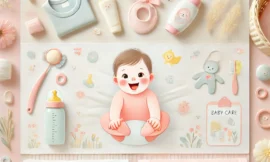Building a Loving Connection: Essential Tips for Bonding with Your Baby

Bonding with your baby is one of the most rewarding and essential parts of parenting. It’s the foundation for a strong, secure relationship that will help your baby feel loved and protected as they grow. Bonding happens through everyday interactions that help build trust, love, and comfort between you and your child. Here’s how you can enhance bonding with your baby and support their emotional and social development.
1. Skin-to-Skin Contact
From the very beginning, skin-to-skin contact is one of the most effective ways to bond with your baby. Right after birth, holding your baby against your skin helps them feel secure and calm. This practice also promotes physical health, as skin-to-skin contact helps regulate the baby’s temperature, heart rate, and breathing. Whether through breastfeeding, bottle-feeding, or simply cuddling, physical closeness can deepen your connection.
2. Eye Contact and Facial Expressions
Newborns may have limited vision, but they can focus best on objects about 8-12 inches from their face — the perfect distance for gazing at their parent’s face during feeding or cuddling. Making eye contact and showing gentle facial expressions help your baby recognize and remember you. This visual engagement helps their brain grow, strengthening the attachment and communication between you.
3. Talking and Singing to Your Baby
Your baby recognizes your voice from their time in the womb, so hearing you speak is both comforting and engaging. Narrate your day, sing soft lullabies, or simply talk to your baby as you would with anyone else. The sound of your voice has a soothing effect, helping the baby feel safe and connected. Additionally, it’s a wonderful way to support language development, even if they don’t understand the words just yet.
4. Gentle Touch and Massage
Babies thrive with gentle, loving touch. Giving your baby a soft massage, especially after bath time or before bed, can help calm them and prepare them for sleep. Massages not only improve circulation and digestion but also offer a great opportunity for physical connection. Use gentle strokes, and let your baby lead by observing their response to see what feels comfortable.
5. Creating Routine and Consistency
Babies feel secure when their environment is predictable. By establishing a routine for feeding, sleeping, and play, you create a comforting structure that your baby can rely on. This consistency can reduce their anxiety and help them understand that they are safe and loved. Routine time together—like a bedtime story every night—fosters a close bond and gives your baby a sense of stability.
6. Responsive Care
Babies communicate through cries, gestures, and sounds. By responding promptly to their cues, you let them know they are heard and valued. Over time, your baby learns to trust you, understanding that you are there to meet their needs. This attentiveness helps build a secure attachment, which is essential for your baby’s long-term emotional health and resilience.
7. Play and Exploration
Playing is one of the most enjoyable ways to bond with your baby. Simple games like peek-a-boo, pat-a-cake, and singing nursery rhymes engage your baby’s senses and help build trust. As your baby grows, encourage their curiosity by giving them safe objects to explore, using toys with different textures, and letting them crawl and discover. Being present during their playtime assures them that you’re there for support and fun.
8. Holding and Carrying
Holding your baby close in a soft carrier or sling gives them a sense of security and keeps them comforted by your presence and warmth. This closeness also makes it easier for you to respond to their needs. Many parents find that “babywearing” strengthens their bond and allows them to multitask while keeping their baby nearby and content.
9. Embrace Quiet Moments Together
Sometimes, bonding doesn’t require activity but rather stillness. Holding your baby in a quiet room, sharing peaceful moments without distraction, allows them to relax and feel comforted by your presence. These quiet moments are valuable for both of you, helping to ease stress and build your connection in a calm environment.
10. Patience and Self-Care
Bonding may take time, especially if you’re adjusting to the demands of a new baby. It’s important to be patient and remember that bonding is a process that happens naturally over time. Taking care of your own mental and physical well-being helps you be fully present and more attuned to your baby’s needs.
Bonding with your baby is a journey, one that builds the foundation of love, trust, and mutual understanding. Through consistent nurturing and care, you’re creating a lasting relationship that supports your child’s emotional growth and sense of security. Enjoy these precious moments and trust that each smile, cuddle, and interaction strengthens your connection and their future.
Bonding with your baby is one of the most rewarding and essential parts of parenting. It’s the foundation for a strong, secure relationship that will help your baby feel loved and protected as they grow. Bonding happens through everyday interactions that help build trust, love, and comfort between you and your child. Here’s how you can enhance bonding with your baby and support their emotional and social development.
1. Skin-to-Skin Contact
From the very beginning, skin-to-skin contact is one of the most effective ways to bond with your baby. Right after birth, holding your baby against your skin helps them feel secure and calm. This practice also promotes physical health, as skin-to-skin contact helps regulate the baby’s temperature, heart rate, and breathing. Whether through breastfeeding, bottle-feeding, or simply cuddling, physical closeness can deepen your connection.
2. Eye Contact and Facial Expressions
Newborns may have limited vision, but they can focus best on objects about 8-12 inches from their face — the perfect distance for gazing at their parent’s face during feeding or cuddling. Making eye contact and showing gentle facial expressions help your baby recognize and remember you. This visual engagement helps their brain grow, strengthening the attachment and communication between you.
3. Talking and Singing to Your Baby
Your baby recognizes your voice from their time in the womb, so hearing you speak is both comforting and engaging. Narrate your day, sing soft lullabies, or simply talk to your baby as you would with anyone else. The sound of your voice has a soothing effect, helping the baby feel safe and connected. Additionally, it’s a wonderful way to support language development, even if they don’t understand the words just yet.
4. Gentle Touch and Massage
Babies thrive with gentle, loving touch. Giving your baby a soft massage, especially after bath time or before bed, can help calm them and prepare them for sleep. Massages not only improve circulation and digestion but also offer a great opportunity for physical connection. Use gentle strokes, and let your baby lead by observing their response to see what feels comfortable.
5. Creating Routine and Consistency
Babies feel secure when their environment is predictable. By establishing a routine for feeding, sleeping, and play, you create a comforting structure that your baby can rely on. This consistency can reduce their anxiety and help them understand that they are safe and loved. Routine time together—like a bedtime story every night—fosters a close bond and gives your baby a sense of stability.
6. Responsive Care
Babies communicate through cries, gestures, and sounds. By responding promptly to their cues, you let them know they are heard and valued. Over time, your baby learns to trust you, understanding that you are there to meet their needs. This attentiveness helps build a secure attachment, which is essential for your baby’s long-term emotional health and resilience.
7. Play and Exploration
Playing is one of the most enjoyable ways to bond with your baby. Simple games like peek-a-boo, pat-a-cake, and singing nursery rhymes engage your baby’s senses and help build trust. As your baby grows, encourage their curiosity by giving them safe objects to explore, using toys with different textures, and letting them crawl and discover. Being present during their playtime assures them that you’re there for support and fun.
8. Holding and Carrying
Holding your baby close in a soft carrier or sling gives them a sense of security and keeps them comforted by your presence and warmth. This closeness also makes it easier for you to respond to their needs. Many parents find that “babywearing” strengthens their bond and allows them to multitask while keeping their baby nearby and content.
9. Embrace Quiet Moments Together
Sometimes, bonding doesn’t require activity but rather stillness. Holding your baby in a quiet room, sharing peaceful moments without distraction, allows them to relax and feel comforted by your presence. These quiet moments are valuable for both of you, helping to ease stress and build your connection in a calm environment.
10. Patience and Self-Care
Bonding may take time, especially if you’re adjusting to the demands of a new baby. It’s important to be patient and remember that bonding is a process that happens naturally over time. Taking care of your own mental and physical well-being helps you be fully present and more attuned to your baby’s needs.
Bonding with your baby is a journey, one that builds the foundation of love, trust, and mutual understanding. Through consistent nurturing and care, you’re creating a lasting relationship that supports your child’s emotional growth and sense of security. Enjoy these precious moments and trust that each smile, cuddle, and interaction strengthens your connection and their future.



